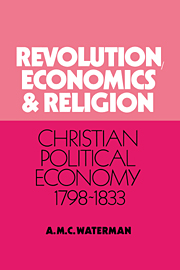Book contents
- Frontmatter
- Contents
- List of figures
- Acknowledgements
- Abbreviations
- 1 POLEMIC, IDEOLOGY AND ‘CHRISTIAN POLITICAL ECONOMY’
- 2 THE FIRST ESSAY ON POPULATION: POLITICAL ECONOMY
- 3 THE FIRST ESSAY ON POPULATION: THEOLOGY
- 4 THE RECONSTRUCTION OF MALTHUSIAN THEODICY: PALEY AND SUMNER
- 5 OXFORD CONTRIBUTIONS: COPLESTON AND WHATELY
- 6 CHALMERS AND THE ESTABLISHMENT
- 7 THE END OF CHRISTIAN POLITICAL ECONOMY
- Appendices: The Malthus–Chalmers model of stationary equilibrium
- Bibliography
- Index
5 - OXFORD CONTRIBUTIONS: COPLESTON AND WHATELY
Published online by Cambridge University Press: 27 August 2009
- Frontmatter
- Contents
- List of figures
- Acknowledgements
- Abbreviations
- 1 POLEMIC, IDEOLOGY AND ‘CHRISTIAN POLITICAL ECONOMY’
- 2 THE FIRST ESSAY ON POPULATION: POLITICAL ECONOMY
- 3 THE FIRST ESSAY ON POPULATION: THEOLOGY
- 4 THE RECONSTRUCTION OF MALTHUSIAN THEODICY: PALEY AND SUMNER
- 5 OXFORD CONTRIBUTIONS: COPLESTON AND WHATELY
- 6 CHALMERS AND THE ESTABLISHMENT
- 7 THE END OF CHRISTIAN POLITICAL ECONOMY
- Appendices: The Malthus–Chalmers model of stationary equilibrium
- Bibliography
- Index
Summary
CHRISTIAN POLITICAL ECONOMY AFTER 1816
Sumner's Records completed the assimilation to sound doctrine of the first anonymous and provocative ‘Remarks on the Speculations of Mr Godwin’. The anti-utopian argument was retained, and the case for private property strengthened by relating it to benign inequality. The dubious theology of the first Essay was replaced by a combination of Malthus's own new concept of ‘moral restraint’ with the orthodox notion of a ‘state of discipline and trial’; and the principle of population, exonerated from the charge of impugning the divine goodness, was employed in defence of the divine wisdom. ‘Gloomy inferences’ were dispelled in part by Sumner's transposition of the theology to a cheerful, Paleyesque conceptual framework, and in part by his emphasizing the possibilities of economic, social and religious amelioration opened up by moral restraint. The whiggish appetite for orderly reform was acknowledged by correlating moral restraint with institutional encouragements, such as parish schools and savings banks, and discouragements, of which the greatest was the Poor Law. The former must be fostered, the latter amended or repealed.
What came next was a final re-shaping of the Essay on Population by Malthus himself; then the correction of certain themes and amplification of others by two of the most brilliant and powerful of that now almost legendary society of Oriel fellows which dominated the intellectual life of Oxford from Copleston's appointment as tutor in 1797 to Whately's departure for Dublin in 1831. This chapter contains a detailed review of their contributions.
- Type
- Chapter
- Information
- Revolution, Economics and ReligionChristian Political Economy, 1798–1833, pp. 171 - 216Publisher: Cambridge University PressPrint publication year: 1991

